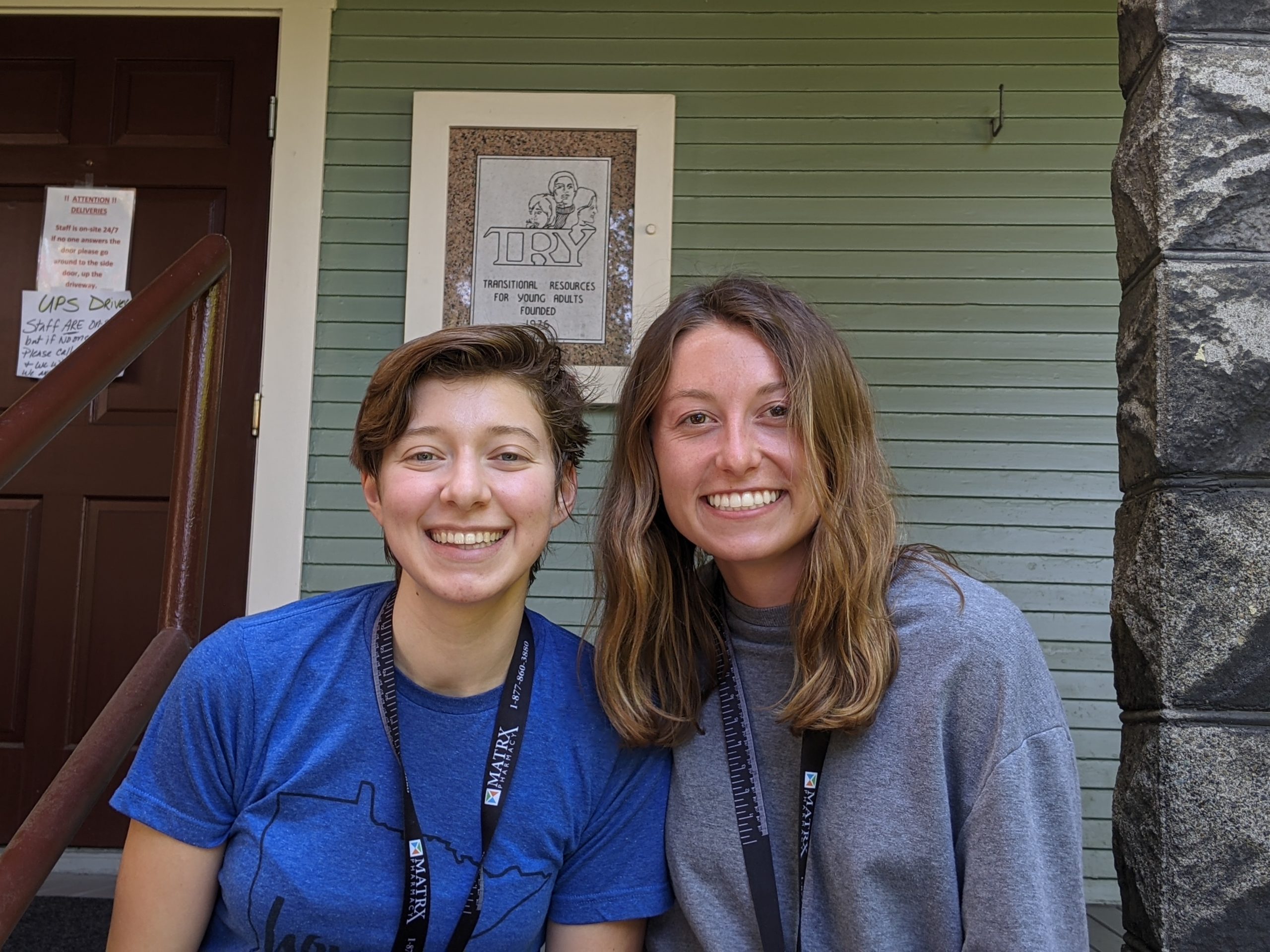Here is the complete interview with our TR Volunteers:
Why were you interested in volunteering at TR?
Left: Christine Siebels-Lindquist from QuEST
Middle: Our volunteers in front of TRY house!
Right: Natalie Behrens from Jesuit Volunteer Corps Northwest
Why were you interested in volunteering at TR?
Christine: I was actually really drawn to the West Coast–I’m from Minnesota originally–and had always wanted to move and live here. My background comes more from the biology and science perspective, but I was really interested to learn about the clinical side of healthcare and learn practical training in mental healthcare, and this position gave me that opportunity.
Natalie: I saw the position and I was fresh off a degree in psychology. I had taken a lot of classes on mental health and had a lot of book knowledge on the subject, but lacked direct experience. I thought it would be a good opportunity to take what I had learned and get practical experience doing what I had studied and was interested in pursuing.
What were your expectations coming in? What were some challenges you faced this year with COVID?
Natalie: I didn’t know what to expect, honestly. I don’t think I really had a lot of expectations—I do think now that you need to be in the role to know truly what it’s about.
Christine: I expected it to be a relationship building role, and so that was a lot of questioning and wondering what would be essential in that, like “What will be involved? What could I offer?” I was really looking forward to that personal aspect of things, then COVID hit.
Natalie: Yes, I agree, a big part of the job description initially was organizing client groups and helping to lead those. I was also very excited for that and being able to build those relationships [in person], but then COVID taking that away was hard.
Christine: We had to shift our work and the new question was, “how do we develop these personal relationships that are much needed in this work that we do [while there is a pandemic]?” Many places went to telehealth and remote work, but TR stayed open because our clients particularly thrive on that kind of one-on-one relationship building and care. But we had to still consider restrictions and guidelines and the safety of everyone.
Natalie: We had to get creative for sure! Really, it became about—and still is about—taking the time to talk to clients when we have the opportunity, usually when they pick up their medications, and extend those interactions just a bit more. We implemented lots of ways to start those conversations and get to know people, like Trivia Tuesdays! That’s where we tell clients a fun trivia fact and that usually sparks a good conversation.
Christine: It’s really about respecting those small interactions and how important those are to our clients. With the pandemic, our opportunities to reach our outpatient clients in particular and to build relationships with them was very limited. But I think we’ve done a good job of working through that and finding those opportunities to connect.
For me as well, it’s that connection and importance of being a source of stability and calm for the clients. That is my role and I want to embrace that. It’s also helpful to have support from co-workers and friends [when things become challenging].
Natalie: Yes, the staff support is especially helpful. It is difficult but rewarding work. It comes with all the challenges that are in the direct service field—but one challenge that comes to mind is the challenge of making progress one day then the next it can feel like it’s back to square one. But that’s sometimes the nature of the work, but it’s not all days.
Christine: Yes, there’s a lot of adjusting and coming to terms with the reality of non-linear progress. And I think we are still working on that.
What do you think people should know about TR and our clients?
Christine: I want people to know how invaluable the sense of community is for folks here [for both staff and clients]. I didn’t fully understand until I came here and began working just how much the clients would be involved in the community, and how much they would trust and confide in me in such a meaningful way. I see all the time how much they care about each other and their kindness. They have an immense capacity to give and share, and they do it often.
Clients can share their struggles, failures, successes—everything—and TR can be with them through this whole trajectory and beyond. I don’t think people realize how truly important that is. Other organizations can’t really do that in most cases, and so it just makes us very unique.
Natalie: The people here are just so special. This is my first job in this field, and I’ve really enjoyed getting to develop personal, meaningful relationships. TR provides the opportunity to do that and get to know people. I’ve also seen how people here deeply support each other—they are truly there for each other and it’s really amazing to see that in so many different ways.
I have witnessed so much growth, both from the clients and from myself. I am definitely a different person now—in a good way. It has been a really formative work experience and it’s been nice to have the mutual relationship with the clients and staff to learn and grow together.




